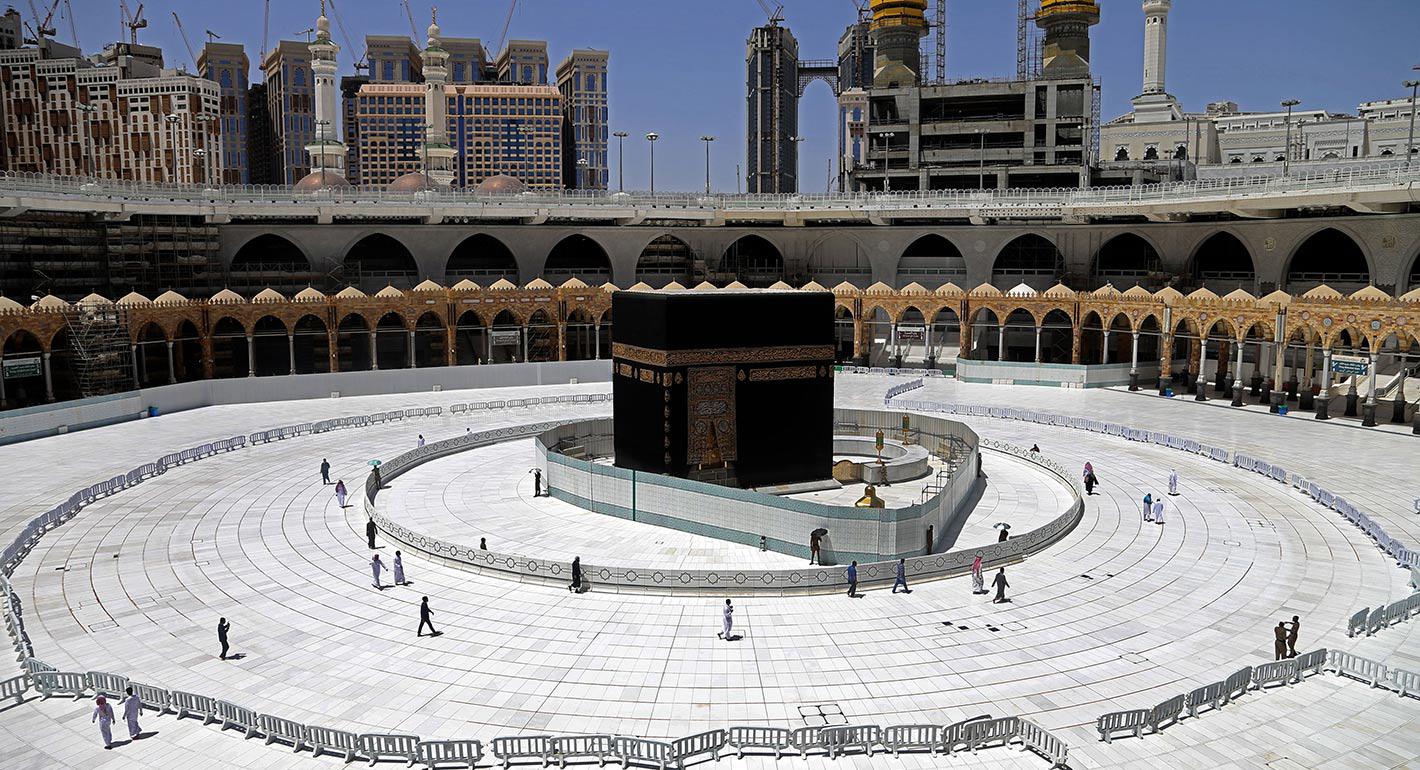When Ramadan begins on April 24, the world’s nearly 2 billion Muslims will experience their holy month very differently amid the coronavirus pandemic. The Kingdom of Saudi Arabia plays a central role in this transformation as the home to Islam’s two holiest sites, Mecca and Medina. The custodianship of both sites is a matter Al Saud monarchs take seriously and consider integral to their legitimacy.
Saudi Arabia has implemented bold measures to fight the coronavirus outbreak. It gradually closed Mecca and Medina, which are now under quarantine and twenty-four-hour curfew, and closed off the largely Shiite Qatif region. The kingdom has also shuttered mosques and suspended religious educational programs and Friday sermons. But these decisions are not borne out of public health or religious concerns alone. Saudi Arabia’s policies cannot be understood apart from its founding moment, future vision, and geopolitical rivalry with Iran. And their results will have important implications for the leadership of King Salman and his heir apparent, Crown Prince Mohammed bin Salman.
Pandemic Flashback
Just over one hundred years ago, the precursor to the rising Saudi state, the Sultanate of Najd, confronted one of its first crises: the Spanish Flu of 1918–1919. Riyadh lost close to 10 percent of its population of 19,000 people. The holy cities would not come under Saudi jurisdiction until 1924–1925, partially due to the ruling Hashemites’ poor performance in protecting people and holy sites during the outbreak.
The ruler at the time, Ibn Saud, had no religious qualms about tapping a Christian missionary hospital for assistance. Dr. Paul Armerding, the head of the American Mission Hospital in Bahrain, and his American colleague Dr. Paul Harrison speedily arrived in Riyadh to help contain the outbreak. While the doctors contributed as much as they could, Ibn Saud lost his eldest son and crown prince, Turki bin Abdulaziz, and one of his favorite wives and cousin, Al Jawhara bint Musaed bin Jiluwi, the mother of King Khaled.
The outbreak taught a lasting lesson: Rapidly seek help from whoever can provide it. Otherwise, risk losing members of the family (and potential heirs) or, worse, legitimacy and power—the fate suffered by the Hashemites, who were deposed from the western Hejaz region after the pandemic. Just as Ibn Saud embraced non-Muslim, non-Arab expertise to contain the Spanish Flu, his twenty-fifth son, King Salman, is doing the same—both to contain the coronavirus and to support the development of Saudi Arabia.
Future Aspirations
As part of its Vision 2030 reform program, the kingdom has increased its openness to the world to boost its economy and transform its conservative religious reputation. Part of that change is premised on religious tourism. To wean the kingdom away from its dependence on oil, the crown prince has loosened restrictions on religious visas in the hope of increasing the number of religious tourists to 25 million per year by 2025 (there were 17.5 million in 2015). But turning Mecca and Medina into holiday destinations with a proper hospitality industry was already a major challenge and has now been further complicated by the coronavirus and its economic impact.
The Iranian Counterpoint
Saudi Arabia’s response to the religious dimensions of the pandemic contrasts sharply with that of its nemesis, Iran. In late February, the Saudis’ closure of Mecca and Medina may have looked rash, though the holy sites were locked down during past wars, floods, and pandemics. On the contrary, Iran’s delay in locking down the holy city of Qom made it a hot spot for virus transmission and sparked widespread criticism.
Iran’s ideological zeal in keeping its religious sites open was not the only factor in its slow initial response to the virus. Political and economic considerations played a role too. The authorities were dealing with a disenchanted electorate and feared measures that would lower the participation rate in the February 21 parliamentary elections. Those concerns were compounded by pressure to maintain economic and diplomatic ties with the Chinese. Banning travel from China would have disrupted an essential trading relationship while the weight of U.S. sanctions increased.
In another politically driven move, the Islamic Revolutionary Guard Corps (IRGC) took over management of the public health challenge, instead of deferring to the health ministry. Hossein Taeb, the head of IRGC’s intelligence, rejected closing Qom, “the honor of Islam,” until the virus spun out of control and he was left with no choice. Neither Saudi Arabia’s military nor its religious scholars have comparable clout, leaving such decisions in the hands of the government and public health experts.
Iran’s initial policy toward its religious sites was driven by ideological and economic considerations, whereas Saudi Arabia focused more immediately on the risks of infection. While both states prioritized worshippers, they each struck a different balance between faith and public health. Responding in part to the consequences of Iran’s inaction and continued access to religious sites, Saudi Arabia adopted an aggressive containment strategy. Its more successful approach bought additional time to prepare the Saudi public and provided a favorable contrast with its regional rival.
Challenges Ahead
Saudi Arabia has benefited from the government’s high degree of control over religious institutions like the council of senior scholars headed by the mufti, the ministries of Islamic affairs and the hajj, the Saudi-funded transnational Muslim World League, and the hayaa or religious police. The state’s quick decisions to overcome the coronavirus have been largely met with praise from citizens and the news media and have reinforced the authority of the king and the crown prince. However, maintaining the closure of mosques during Ramadan and possibly scrapping the late July Hajj pilgrimage—for what would be the first time since the bubonic plague outbreak of 1814—will test acquiescence to state policy by both the public and state religious institutions. Balancing public health, religious observance, and economic aspirations is no easy feat, and Saudi Arabia’s next steps will be closely watched in the months ahead.



